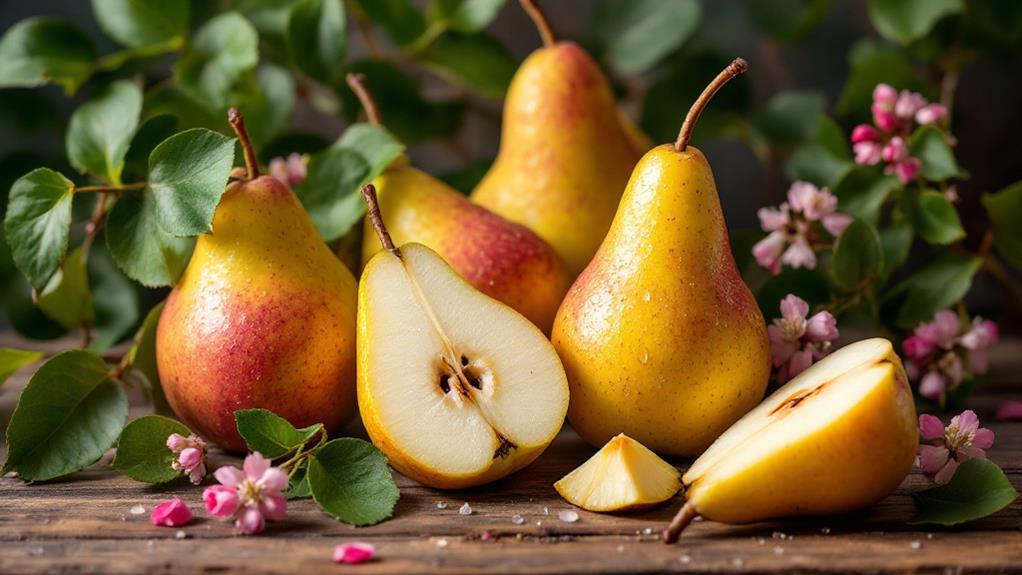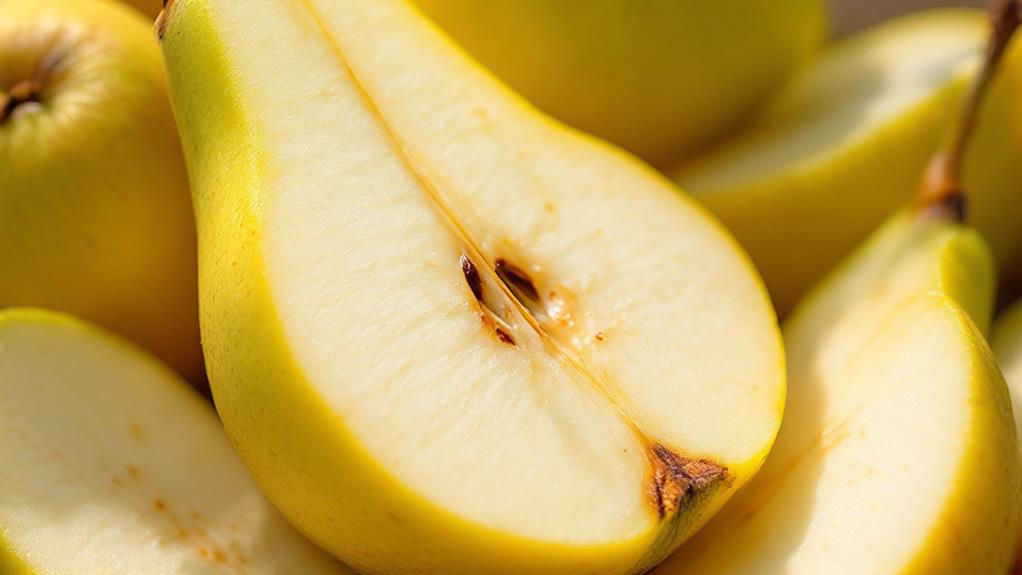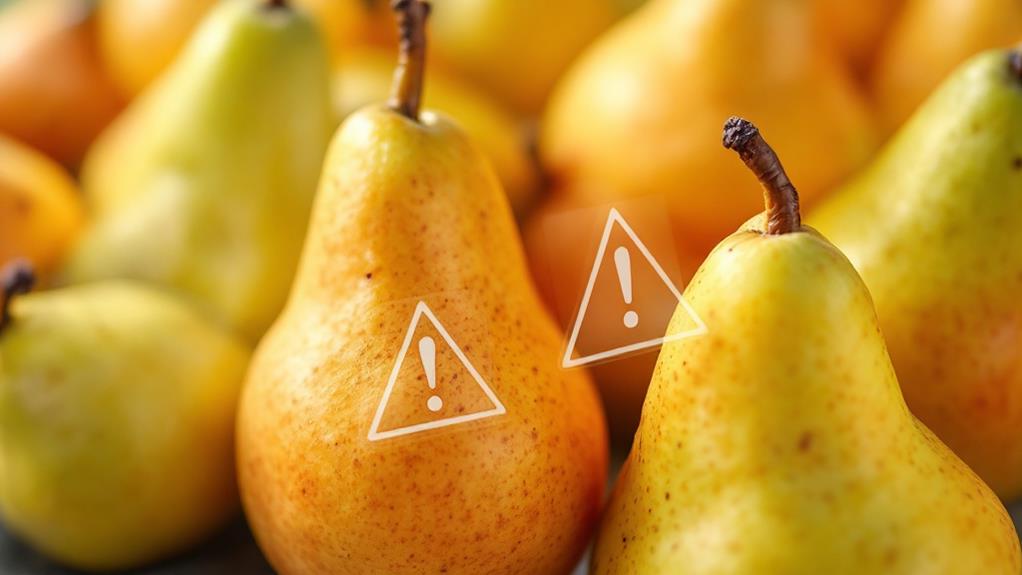Why We Should Eat More Pears: Health Benefits and Nutritional Value

You should eat more pears because they're a nutritional powerhouse with several health benefits. A medium pear enhances your immune system with vitamin C and provides blood-clotting support with vitamin K. It aids digestion with 6 grams of fiber, promoting regular bowel movements and heart health by lowering cholesterol. The potassium in pears helps regulate blood pressure, while antioxidants in the peel combat inflammation, reducing chronic disease risks. Plus, they're low-calorie, making them a perfect snack for weight management. With these benefits, there's more to uncover about how pears can contribute to your comprehensive well-being.
Nutritional Profile of Pears
In regards to the nutritional profile of pears, you'll find they're a low-calorie, nutrient-dense fruit packed with advantages. A medium pear contains about 101 calories, making it a great option if you're watching your caloric intake while still wanting to enjoy something delicious and satisfying. But it's not just about calories; pears are nutrient-dense, offering crucial vitamins and minerals that support your complete well-being.
A medium pear provides 9% of your Daily Value for vitamin C, an antioxidant that helps enhance your immune system and promote skin health. You'll also get 7% of your Daily Value for vitamin K, which is indispensable for blood clotting and bone health. With 206 mg of potassium, pears contribute to heart health by helping maintain normal blood pressure levels. They also provide 0.15 mg of copper, which supports enzyme function and iron metabolism.
Moreover, don't overlook the peel! It contains up to six times more polyphenols compared to the flesh, giving you a rich source of antioxidants that combat oxidative stress. With 6 grams of fiber, pears are a friend to your digestive health, promoting regularity and fullness.
Fiber Benefits for Digestion
As you bite into a juicy pear, you're not just enjoying its sweet taste but also reaping significant fiber benefits for digestion. Packed with about 6 grams of fiber per medium pear, these fruits make up roughly 21% of your daily fiber intake. This high fiber content supports regular bowel movements, essential for preventing constipation. The soluble fiber, especially pectin, softens stool, making it easier to pass. Meanwhile, the insoluble fiber adds bulk to your digestive system, promoting a healthy gut microbiome and preventing gastrointestinal issues.
Eating pears regularly does more than just aid digestion. Their high fiber intake is beneficial for diabetics, as it helps regulate blood sugar levels, making pears a great choice for weight management too. Additionally, the fiber benefits extend to your heart. By lowering cholesterol levels, pears contribute to reducing the risk of heart disease, supporting comprehensive cardiovascular health.
Incorporating pears into your diet utilizes their fiber benefits for better digestion and beyond. If you're focused on maintaining a healthy gut, managing your weight, or keeping your heart in check, pears are a delicious and nutritious choice to reflect on.
Anti-Inflammatory Effects

With each bite of a pear, you're not only enjoying a delicious fruit but also tapping into its remarkable anti-inflammatory effects. Pears are packed with flavonoid antioxidants, like quercetin, which play an essential role in reducing inflammation markers in your body. By doing so, they help lower the risk of chronic diseases linked to inflammation, such as heart disease and type 2 diabetes. The high antioxidant content, especially in the peel, combats oxidative stress, a significant contributor to chronic inflammation.
Including pears in your diet can be a smart choice, especially if you're active. Their anti-inflammatory properties support recovery from exercise-induced inflammation, making pears a beneficial post-workout snack. Furthermore, the vitamins C and K found in pears, along with copper, further bolster their ability to fight inflammation and improve your general health.
Pears are not just tasty; they're also rich in fiber, contributing to a balanced diet. Studies suggest that a diet high in flavonoid-rich fruits like pears is associated with a lower risk of developing inflammatory diseases. So, by incorporating pears into your daily routine, you're taking a delicious step toward better health.
Heart Health Advantages
In relation to supporting heart health, pears pack a powerful punch. They're rich in procyanidin antioxidants, which can help lower LDL cholesterol levels while elevating HDL cholesterol. This dual action considerably improves cardiovascular health. By incorporating pears into your diet, you can actively reduce risk factors associated with heart disease. For example, studies show that consuming two medium pears daily can lower heart disease risk factors in adults with metabolic syndrome. These benefits include reduced systolic blood pressure and waist circumference, both of which are vital for maintaining a healthy heart.
The high fiber content in pears also plays a key role. Fiber helps in lowering cholesterol levels, which, in turn, reduces the risk of heart disease. Regularly eating pears has been associated with a 6-7% decrease in heart disease risk, making them a valuable supplement to a heart-healthy diet. Furthermore, pears are a good source of potassium, aiding in blood pressure regulation. This is particularly essential for reducing hypertension risk, further supporting cardiovascular health. By adding pears to your daily meals, you're not only enjoying a delicious fruit but also taking a proactive step towards better heart health.
Disease Prevention Potential

Pears aren't just tasty; they're a powerhouse for disease prevention. Regularly munching on pears links you to a lower risk of numerous diseases, especially cardiovascular disease. Their high fiber content is key to this benefit, as it supports heart health by reducing cholesterol levels. But that's not all—pears are rich in antioxidants and flavonoids, which play a role in reducing the risk of certain cancers, including lung and stomach cancer.
Pears also contain phytonutrients that help combat inflammation, a major player in chronic diseases like type 2 diabetes and heart disease. By incorporating pears into your diet, you're not just enjoying their sweet taste but also harnessing their potential to fight off these conditions. The fiber content in pears isn't only good for your heart; it greatly enhances digestive health too. It promotes regular bowel movements and supports a healthy gut microbiome, possibly reducing the risk of colorectal cancer.
Moreover, pears can help in managing blood sugar levels and improving insulin sensitivity, lowering your risk of developing type 2 diabetes. Embracing pears means embracing a natural ally in disease prevention, thanks to their incredible health benefits.
Weight Management Support
When you're looking to manage your weight, pears can be an excellent ally. A medium pear, with only about 101 calories, makes a weight-friendly snack. Its high fiber content—approximately 6 grams per medium pear—promotes a feeling of fullness, helping you reduce total calorie intake. By incorporating two medium pears into your daily diet, you can see a reduction in waist circumference of up to 0.3 inches. This makes pears a smart choice for those keen on weight management.
Studies suggest that adding three pears to your diet can result in a loss of pounds, with participants losing an average of 1.9 pounds over a 10-week period. This showcases the effectiveness of pears in supporting your weight loss path. Pears provide natural sugars that contribute to energy production without the burden of excessive calories, offering a healthier alternative to other high-calorie snacks. If you're looking to curb hunger between meals or need a quick energy enhancement, reaching for a pear can help you achieve your weight goals efficiently. By making pears a regular part of your diet, you're embracing a delicious strategy for effective weight management.
Eating the Peel

Although often overlooked, eating the peel of a pear can greatly improve your intake of antioxidants and important nutrients. The peel is a powerhouse of polyphenols, offering up to six times more antioxidants than the flesh. These antioxidants are fundamental for combating oxidative stress and inflammation, contributing considerably to your complete health. By not peeling your pear, you're also increasing your fiber intake. A medium pear with its peel provides about 5.5 grams of fiber, promoting better digestion and supporting gut health.
Eating the peel guarantees you're maximizing the health benefits of pears. Here's why you should consider keeping the skin on:
- Nutrient Density: The peel is packed with vitamins such as C and K, crucial for immune function and blood clotting.
- Improved Nutritional Profile: Many beneficial plant compounds are concentrated in the peel, optimizing the pear's nutritional profile.
- Mineral Increase: Pear skin contains important minerals that contribute to your wellbeing.
- Full Health Benefits: Opting for whole pears with the skin intact guarantees you receive the full range of health benefits.
Easy Dietary Integration
Integrating pears into your diet is both simple and advantageous. With their year-round availability in grocery stores, pears make a convenient choice for daily consumption. You can enjoy them fresh as a nutritious snack that's low in calories but high in fiber, helping to promote satiety and curb overeating. Their natural sweetness and juicy texture make them perfect for satisfying your sweet tooth while keeping your calorie intake in check.
Incorporating pears into meals offers versatile options for meal preparation. Slice or dice them into your morning oatmeal or blend them into smoothies for extra flavor and nutrients. Roasting or poaching pears amplifies their sweetness, making them a delightful supplement to salads or desserts. You can even pair them with proteins like chicken or pork, creating savory dishes that not only taste great but also elevate your complete nutrient intake.
Pear Allergies Explained

Pear allergies, though relatively rare, can cause significant discomfort for those affected. These allergies occur when your immune system mistakenly identifies specific proteins in pears as harmful. This triggers an immune response, resulting in symptoms like hives, swelling, and digestive issues. If you suspect you have a pear allergy, it is crucial to understand the process for diagnosis and management.
- Diagnosis: Identifying pear allergies typically involves skin prick tests or blood tests. These tests measure specific IgE antibodies to pear proteins to confirm an allergy.
- Cross-reactivity: If you're allergic to birch pollen, you might also react to pears. This happens due to similar protein structures, so be cautious of potential reactions.
- Management: The primary strategy for managing pear allergies is avoiding pears and products containing pear-derived ingredients. This helps prevent unwanted immune responses.
- Consultation: Always consult an allergist if you have a known pear allergy. They can provide personalized advice and help you navigate concerns like cross-contamination with other fruits.




